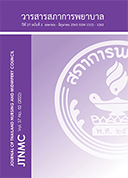Maternal Preparation for Hospital’s Discharge of Preterm Infants
Keywords:
Hospital discharge, Discharge readiness, Preterm infantsAbstract
Mothers’ preparedness for the hospital’s discharge of preterm infants is an important determinant of success in hospital-to-home transitional care. This article proposes guidelines for maternal preparation for discharge of preterm infants from the hospital based on Albert Bandura’s (1997) framework. This framework concentrates on four strategies, namely, 1) mastery experiences; 2) modelling; 3) verbal persuasion; and 4) physiological and affective states.
Hospital-to-home discharge of preterm infants is a transitional process that necessitates mothers’ adjustment and readiness to care for their preterm infants. According to Bandura’s (1997) framework, pre-discharge maternal preparation gives the mothers confdence and ability to provide their infants with proper post-discharge long-term care.
Downloads
References
Strategy and Planning Division. Public Health Statistics A.D. 2019 [Internet]. 1st ed. Bangkok; 2019 [cited 2020 Nov 29]. Available from: https://bps.moph.go.th/new_bps/ sites/default/ fles/statistic62.pdf
Brett J, Staniszewska S, Newburn M, Jones N, Taylor L. A systematic mapping review of effective interventions for communicating with, supporting and providing information to parents of preterm infants. BMJ Open 2011; 1(1): e000023.
Bandura A. Guide for constructing self- effcacy scales. Stanford, CA: Stanford University; 1997.
Kelly MM. Primary care issues for the healthy premature infant. J Pediatr Health Care. 2006; 20(5): 293-9.
Namprom N, Suklerttrakul T. Nursing newborn and specifc problem children. Chiangmai: Smart Coating and Services; 2020.
Engle WA, Tomashek KM, Wallman C, et al. “Latepreterm” infants: a population at risk. Pediatrics. 2007; 120(6): 1390-401.
McCourt MF, Griffn CM. Comprehensive primary care follow-up for premature infants. J Pediatr Health Care. 2000; 14(6): 270-9.
Bhutta ZA, Khan I, Salat S, et al. Reducing length of stay in hospital for very low birth weight infants by involving mothers in a stepdown unit: an experience from Karachi (Pakistan). BMJ 2004; 329(7475): 1151-5.
McCain G. Family functioning 2 to 4 years after preterm infant. J Pediatr Nurs 1990; 5, 97-104.
Sangsawang J. Chupradit P. The Theory of attachment for promoting breastfeeding among adolescent mothers. Journal of The Police Nurse 2021; 13(1): 227-34. (in Thai)
Klaus MH. Kennell JH. Care of high- risk neonate. Philadelphia: Saunders; 2011.
Apichutboonchock S. Parents, participation on their preterm development support in neonatal intensive care unit. Nursing Journal 2013;57(1):65-72. (in Thai)
Charatvisitkul K, Chusak T. Effects of infant massage on the growth of infants and maternal-infant attachment of neonatal patient Sawan Pracharak Hospital, Nakhon Sawan Province. Valaya Alongkorn Rajabhat University Research and Development Journal Science and Technology 2018;13(1):76-86. (in Thai)
Homsombat P, Wittayasooporn J, Daramas T. The effect of kangaroo care on sleep duration in preterm infants. Ramathibodi Nursing Journal 2020;26(1): 31-45. (in Thai)
Pengpan K, Siriboonpipattana P. Caring for premature infants with enteral feeding. Regional Health Promotion Center 9 Journal 2021; 15(36): 15-30. (in Thai)
Srichalerm T, Daramas T, Phumonsakul S. The effect of music on sleep-wake states of premature infants in a Neonatal Intensive Care Unit. Ramathibodi Nursing Journal 2011; 17(2): 178-190. (in Thai)
Jarus T, Bloch L, Rabinovitch G, Sadeh A, Dolfn T, Litmanovitz I, Bart, O. Effects of prone and supine positions on sleep state and stress responses in preterm infants. Infant Behavior and Development 2011; 34, 257-263.
Pogcar MS, Mave U, Varda NM, Micetic-Turk D. Diagnosis and management of diaper dermatitis in infants with emphasis on skin microbiota in the diaper area. Int J Dermatol 2017;57 (Suppl 1), 1-11.
Jefferies AL, Canadian Paediatric Society, etus and Newborn Committee. Going home: facilitating discharge of the preterm infant. Paediatric Child Health 2014; 19(1), 31-36.
Phumket W, Thato R. promoting program by coaching on premature infants caring behaviors of frst-time adolescent mothers. Thai Red Cross Nursing Journal 2008; 1(1), 51-67. (in Thai)
Wangruangsatid R, Rangsiyanon J, Rungchay A, Dumminsek P, Saisuwan W. Maternal preparation guideline for taking care of premature infants after discharge in Thailand: a systematic review. Songklanagarind Journal of Nursing 2019; 39(1): 66-78. (in Thai)
Pothale P, Jirapaet V. Effect of coaching program on caring behavior for preventing sudden infant death syndrome in preterm infants’ mothers. Chula Med Bull 2019; 1(1): 71-78. (in Thai)
Tongkhammak S, Jirapaet V. Effects of coaching program for enhancing newborn rearing behavior of mother on preterm infant’s health outcomes. Journal of Nursing Science Chulalongkorn University 2013; 25(3): 133-144. (in Thai)
Punthmatharith B, Thepchana N. Effects of maternal needs preparation on satisfaction and anxiety of mothers having premature infants in the neonatal intensive care unit. Songklanagarind Journal of Nursing 2012;32(2):1-21. (in Thai)
Kalasin J, Siripul P, Thannadee SK. Effect of a maternal perceived self-effcacy enhancement program on perceived self-effcacy, caring behavior for preterm infants with hyperbilirubinemia, receiving phototherapy and infants’ serum bilirubin levels. Journal of Nursing and Health Care 2020; 38(3): 129-138. (in Thai)
Downloads
Published
How to Cite
Issue
Section
License
Copyright (c) 2022 Thai Journal of Nursing Council

This work is licensed under a Creative Commons Attribution-NonCommercial-NoDerivatives 4.0 International License.








